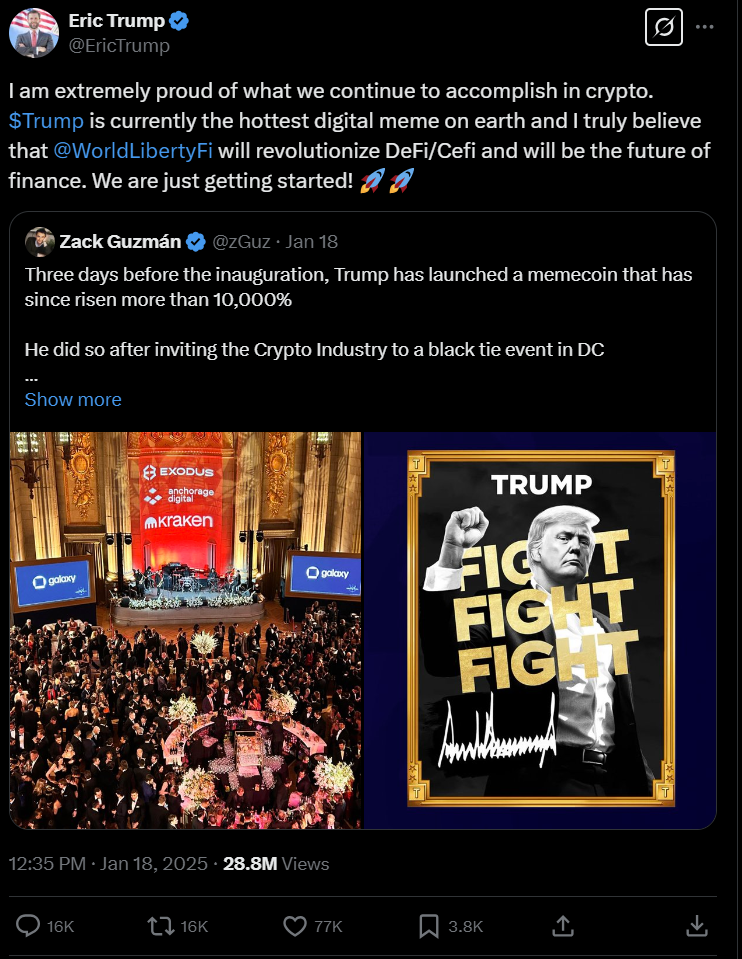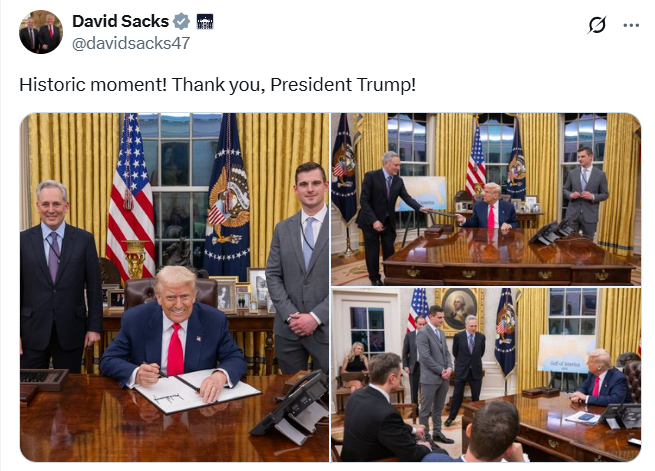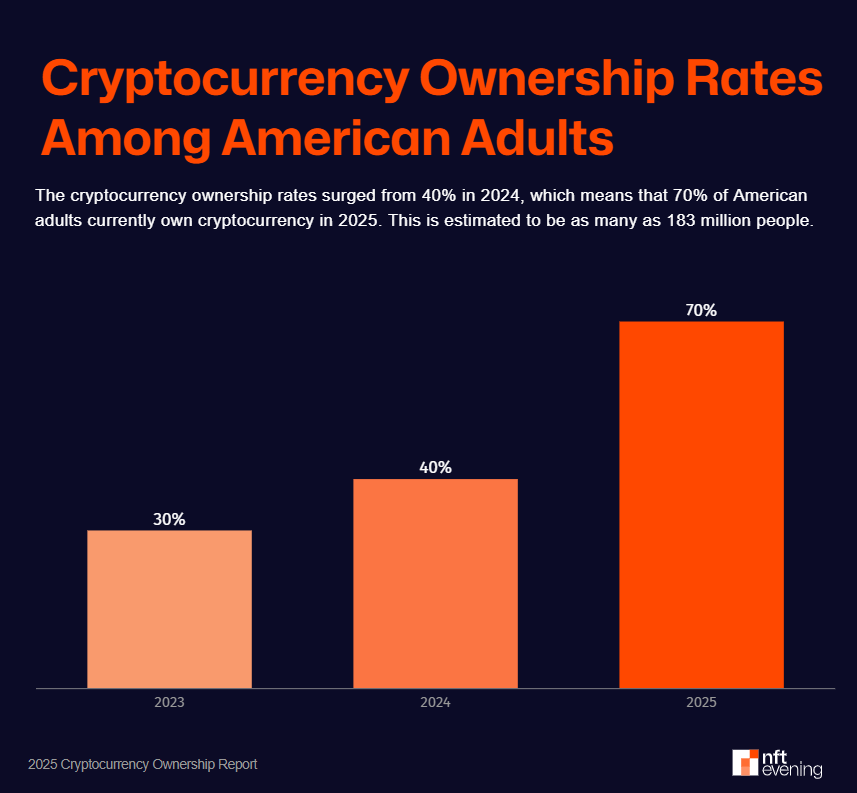The growing influence of the cryptocurrency sector in Washington DC has increased the likelihood of receiving favorable legislation for the industry, but it has also introduced various challenges.
As crypto lobbying gains traction, fears of regulatory capture—where regulators or lawmakers become aligned with the interests of a specific group—are on the rise.
The dangers of regulatory capture are twofold: firstly, it can exclude the public interest from policy decisions, favoring one particular industry or organization, and secondly, it may lead regulators to ignore or become immobilized by potential economic threats.
With only a few months into Trump’s presidency, U.S. politicians and crypto watchdogs have expressed apprehensions that such regulatory capture could not only adversely impact the nation but also stifle competition within the cryptocurrency sector.
Regulatory capture in the fight for crypto regulation
A letter from key members of the U.S. Senate Banking Committee and Finance Committee directed to Acting Comptroller Rodney Hood and Michelle Bowman, Chair of the Federal Reserve Board of Governors’ Committee on Supervision and Regulation, raised concerns about this issue.
The correspondence specifically highlights the launch of USD1, a stablecoin initiative tied to the Trump family’s decentralized finance venture, World Liberty Financial (WLFI), at a time when Congress is reviewing GENIUS Act legislation concerning stablecoins.
Related: Trump’s cryptocurrency venture unveils stablecoin on BNB Chain, Ethereum
The senators pointed out potential risks of regulatory capture and conflicts of interest, noting that “President Trump may scrutinize any actions the OCC takes regarding USD1’s stablecoin application, allowing him to obstruct or prevent essential safeguards or enforcement actions against WLF.”

Eric Trump promotes his father’s memecoin ahead of the inauguration. Source: Eric Trump
They further noted that he could try to interfere with or deny support to competitors of USD1, with the GENIUS Act lacking any measures to avert such behavior.
Industry experts have also raised alarms about an overwhelming influence of a single entity on regulatory developments, particularly regarding Coinbase’s role in shaping stablecoin policy in Washington.
In January, Coinbase CEO Brian Armstrong indicated that his company would be prepared to remove Tether (USDT), the largest stablecoin globally, should the current version of the stablecoin bill become law.
Such a scenario would essentially eliminate the largest competitor from the U.S. market in favor of USDC, of which Coinbase holds significant shares.
Nic Carter, a partner at Castle Island Ventures, expressed his dismay, stating that “Regulatory capture is toxic and reminiscent of what SBF used to engage in.”
Related: SBF consistently navigated both sides despite recent Republican appeals
At the same time, Vance Spencer, founder of crypto venture firm Framework Ventures, labeled it as “a blatant regulatory capture attempt by U.S. entities that undermines national interest.”
“The future of stablecoins can only be dollar-based if we allow a wider array of stablecoin issuers to prosper, without gatekeeping and manipulation from those seeking regulatory capture,” he concluded.
George Selgin, a senior fellow and former director at the Cato Institute’s Center for Monetary and Financial Alternatives, indicated that the Bitcoin reserve is yet another clear instance of the crypto lobby’s sway over regulatory procedures.

Trump signs the Bitcoin reserve executive order. Source: David Sacks
“It’s doubtful anyone would have considered it essential or even desirable for the U.S. government to maintain digital asset reserves, had it not been for the heavy influence of cryptocurrency advocates,” he stated.
Regulatory capture is a longstanding issue in Washington
Influence from various lobbies on policymaking is not a novel phenomenon in Washington; thus, “regulatory capture” could simply seem like standard practice to many.
Selgin mentioned that the Biden administration’s strategy toward cryptocurrency exemplifies a different form of regulatory capture favoring traditional financial institutions that seek to limit competition from emerging players.
“Regulators’ relatively unfriendly approach to crypto under Biden was no less indicative of regulatory capture than the current more lenient stance. The key distinction lies in who exercises that influence,” he noted.
“Financial regulatory capture is a long-standing narrative; only some new players have emerged as skilled hunters.”
When asked how to discern between authentic industry advocacy and regulatory capture, Selgin remarked, “I don’t think a distinction is necessary. The line separating the two is quite fine.”
Industries seldom assert complete dominion over regulators since individual firms often have different perspectives on ideal regulations, according to Selgin. Furthermore, any effective advocacy slightly ‘captures’ regulators simply by altering their views about the optimal approach to regulation.
What actions can be taken?
This brings us to the pressing question: should regulatory capture simply be accepted as an inevitable aspect of the policymaking framework?
Some scholars have proposed establishing entirely new government entities to tackle the issue. Gerard Caprio, emeritus professor of economics at Williams College, has suggested creating an expert panel called a “Sentinel” to monitor regulatory behavior.
However, such ideas encounter significant obstacles, not only due to their technical intricacies but also because lawmakers typically lack the motivation to create an oversight body for themselves.
Related: Trump’s CFTC appointee Brian Quintenz brings crypto into the revolving door
According to Selgin, the key issue is not about whether and how the industry influences regulators, but whether the resulting regulatory framework actually serves the public good. “If a regulation is detrimental, it remains detrimental regardless of whether it was lobbied for or not,” he remarked.
However, the public’s interest in cryptocurrency is becoming increasingly obscure. Recent polls on crypto perception, trust, and ownership demonstrate drastic discrepancies, and the Trump administration’s personal stake has failed to foster trust among skeptics or undecided voters.

Some industry surveys suggest that around 70% of Americans possess cryptocurrency. Source: NFT Evening
Even proponents of crypto acknowledge that the (barely) bipartisan push for cryptocurrency legislation is motivated by a desire to cater to the industry’s financial strengths as the 2026 midterms approach.
Dave Grimaldi, executive vice president of government relations at a key crypto association, stated, “There are […] pro-crypto candidates who won with support from our industry and received votes from crypto users in their districts. […] Conversely, some incumbents lost their seats due to their opposing stance for totally unwarranted reasons.”
Real progress is unlikely until lawmakers and regulators come to terms with the existence of this issue and find the political resolve to address it.
Magazine: Co-founder of Arbitrum doubts the shift toward based and native rollups: Steven Goldfeder
